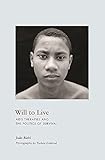Will to Live : AIDS Therapies and the Politics of Survival / João Biehl.
Material type: TextSeries: In-FormationPublisher: Princeton, NJ : Princeton University Press, [2021]Copyright date: ©2007Description: 1 online resource (472 p.) : 109 halftones. 5 line illus. 6 tablesContent type:
TextSeries: In-FormationPublisher: Princeton, NJ : Princeton University Press, [2021]Copyright date: ©2007Description: 1 online resource (472 p.) : 109 halftones. 5 line illus. 6 tablesContent type: - 9781400832798
- 362.196979200981 23
- RA643.86.B6 B54 2007eb
- online - DeGruyter
| Item type | Current library | Call number | URL | Status | Notes | Barcode | |
|---|---|---|---|---|---|---|---|
 eBook
eBook
|
Biblioteca "Angelicum" Pont. Univ. S.Tommaso d'Aquino Nuvola online | online - DeGruyter (Browse shelf(Opens below)) | Online access | Not for loan (Accesso limitato) | Accesso per gli utenti autorizzati / Access for authorized users | (dgr)9781400832798 |
Frontmatter -- Contents -- Introduction. A NEW WORLD OF HEALTH -- Chapter One. PHARMACEUTICAL GOVERNANCE -- Chapter Two. CIRCUITS OF CARE -- Chapter Three. A HIDDEN EPIDEMIC -- Chapter Four. EXPERIMENTAL SUBJECTS -- Chapter Five. PATIENT-CITIZENSHIP -- Chapter Six. WILL TO LIVE -- Conclusion. GLOBAL PUBLIC HEALTH -- Acknowledgments -- Notes -- References -- Index
restricted access online access with authorization star
http://purl.org/coar/access_right/c_16ec
Will to Live tells how Brazil, against all odds, became the first developing country to universalize access to life-saving AIDS therapies--a breakthrough made possible by an unexpected alliance of activists, government reformers, development agencies, and the pharmaceutical industry. But anthropologist João Biehl also tells why this policy, hailed as a model worldwide, has been so difficult to implement among poor Brazilians with HIV/AIDS, who are often stigmatized as noncompliant or untreatable, becoming invisible to the public. More broadly, Biehl examines the political economy of pharmaceuticals that lies behind large-scale treatment rollouts, revealing the possibilities and inequalities that come with a magic bullet approach to health care. By moving back and forth between the institutions shaping the Brazilian response to AIDS and the people affected by the disease, Biehl has created a book of unusual vividness, scope, and detail. At the core of Will to Live is a group of AIDS patients--unemployed, homeless, involved with prostitution and drugs--that established a makeshift health service. Biehl chronicled the personal lives of these people for over ten years and Torben Eskerod represents them here in more than one hundred stark photographs. Ethnography, social medicine, and art merge in this unique book, illuminating the care and agency needed to extend life amid perennial violence. Full of lessons for the future, Will to Live promises to have a lasting influence in the social sciences and in the theory and practice of global public health.
Mode of access: Internet via World Wide Web.
In English.
Description based on online resource; title from PDF title page (publisher's Web site, viewed 27. Okt 2021)


